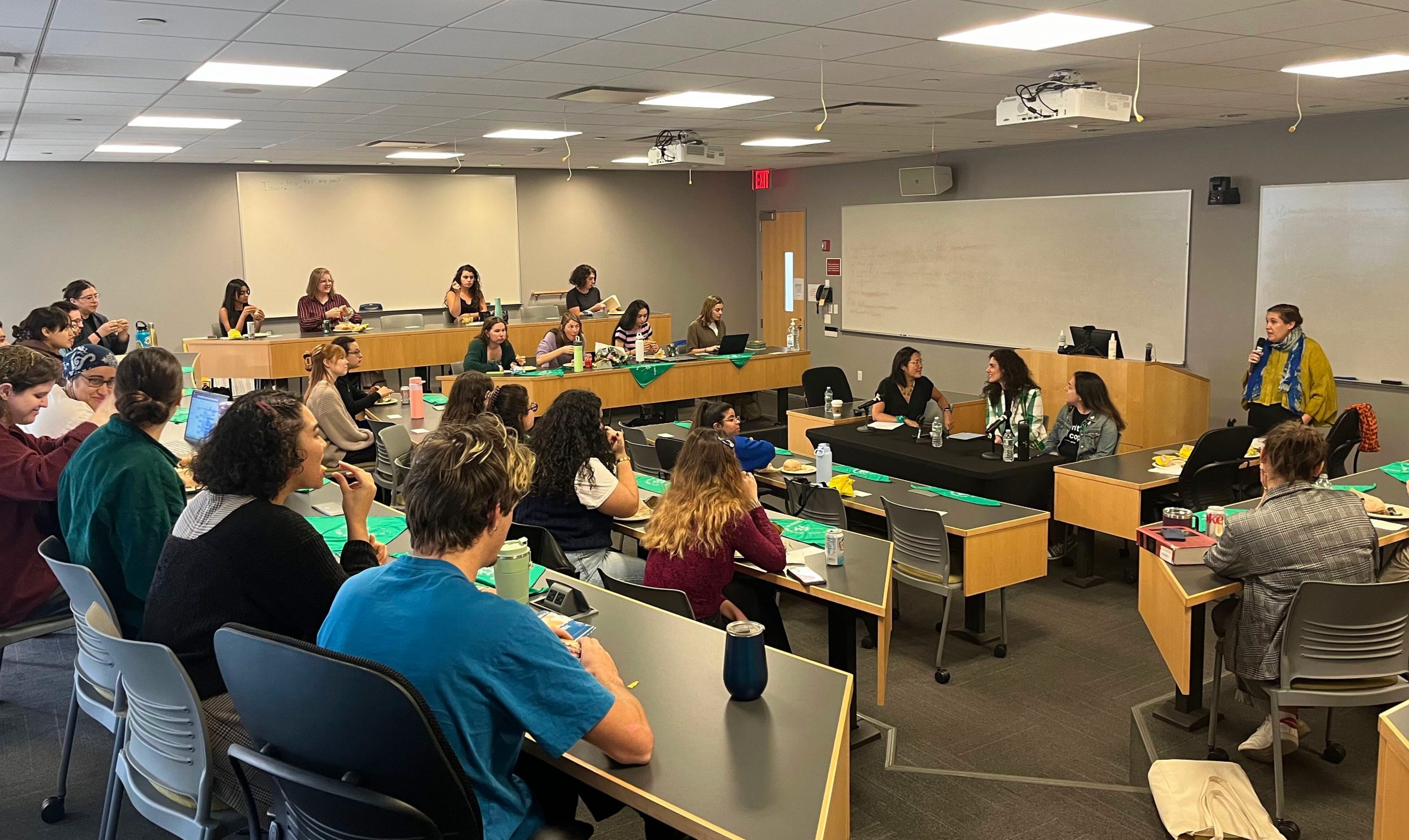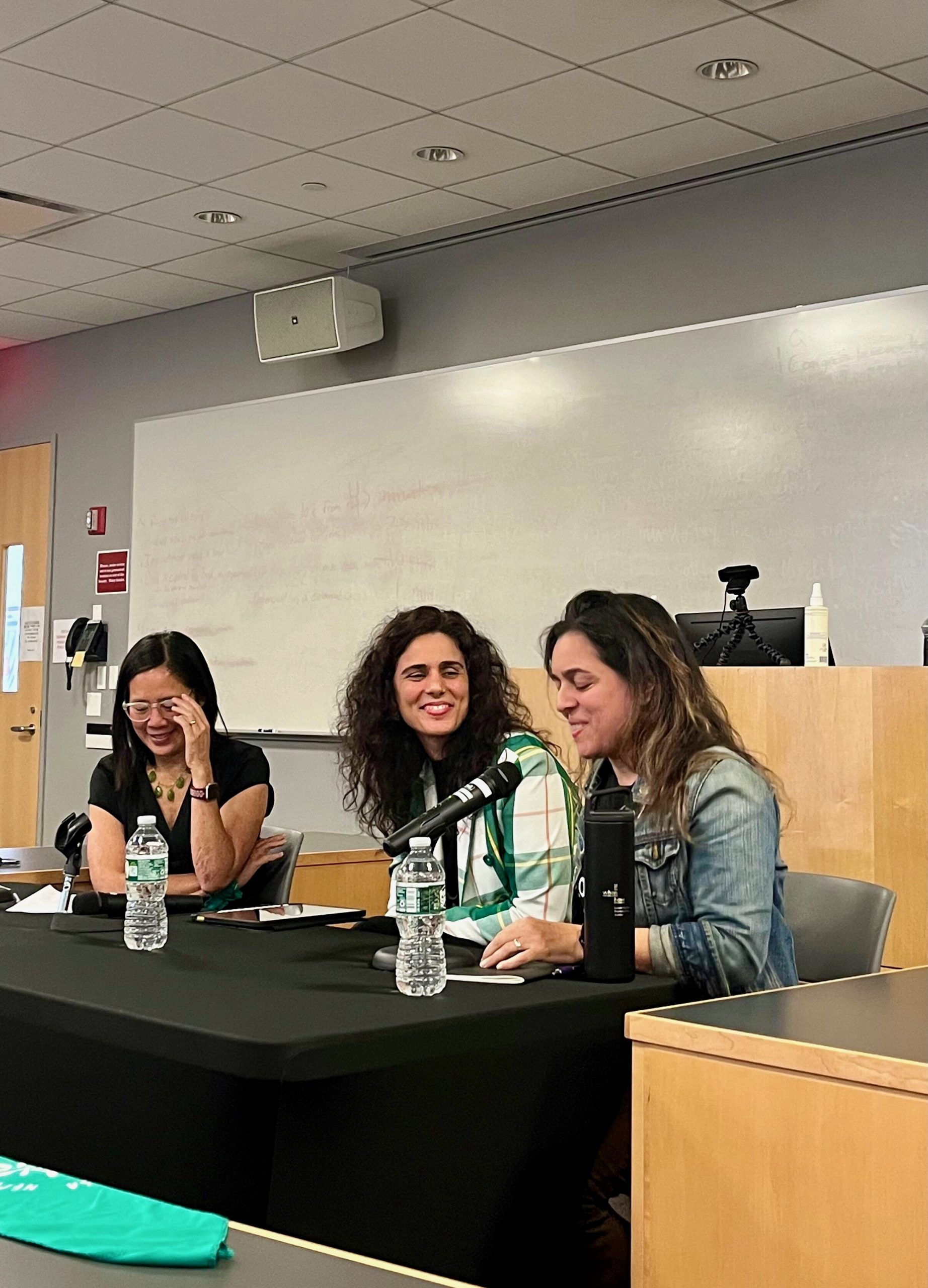Institute hosts October 2024 panel, “From the U.S. to Brazil: Tides of Setbacks and Progress, Abortion Access, and the Law” at CUNY School of Law.
BY MOLLY BANGS, PROGRAM MANAGER

IGLTP Managing Director Dr. Mikaela Luttrell-Rowland introduced the October 23, 2024 panel, “From the U.S. to Brazil: Tides of Setbacks and Progress, Abortion Access, and the Law” featuring Professor Cindy Soohoo, Dr. Mariana Prandini Assis, and Farah Diaz-Tello.
Photo Credit: Molly Bangs
On Election Day, New York voters passed Proposition 1, enshrining abortion rights into the New York State Constitution through the Equal Rights Amendment.
This latest protection for abortion rights is part of a decades-long trend toward the liberalization of abortion laws globally, due to the advocacy of sexual and reproductive health, rights, and justice (SRHRJ) movements including the Green Wave, or la Marea Verde, across Latin America. But there has also been backlash in recent years, with a handful of countries including the United States acting against these tides of progress, rolling back reproductive rights and criminalizing abortion. Other countries have been slow to expand legal protections for abortion, as is the case in Brazil.
What are the legal and on-the-ground realities of abortion access, and what can reproductive justice lawyers do about it? On October 23, 2024, the Institute on Gender, Law, and Transformative Peace at CUNY School of Law hosted a panel conversation to explore these questions in the comparative contexts of the U.S. and Brazil.
The event, which was co-sponsored by the Human Rights & Gender Justice Clinic at CUNY School of Law, and CUNY Law’s chapter of If/When/How: Lawyers for Reproductive Justice, featured a panel conversation moderated by CUNY Law Professor Cindy Soohoo, Co-Director, Human Rights and Gender Justice Clinic, with Dr. Mariana Prandini Assis, Assistant Professor of Political Science, Universidade Federal de Goiás in Brazil and Co-Founder, Margarida Alves Collective for People’s Legal Aid, and Farah Diaz-Tello, Senior Counsel & Legal Director, If/When/How: Lawyers for Reproductive Justice.
The panelists began with the realities of access to reproductive health care in both Brazil and the United States. The Brazilian 1940 Penal Code classifies abortion as a crime, and even in cases where it is legal (rape, threat to pregnant person’s life and fetal anencephaly, a fatal abnormality), it is very difficult to access. Assis discussed the unequal state of abortion access: the country, explaining how legal abortion services are only available in select large cities. “People who are living in rural areas or in the smaller cities, either [have to] travel to the large cities or have to access abortion in some other way.” She continued to discuss medication abortion, explaining how Mifepristone, one of two drugs used in medication abortion, is unregistered and unavailable in Brazil. The other drug, Misoprostol, is highly controlled and only accessible in healthcare facilities specifically authorized by the Minister of Health. Assis explained that these restrictions result in huge inequalities, with white middle- and upper-class pregnant people still able to access safe clandestine abortion, whereas working class people of color are being criminalized for illegal abortions.
Meanwhile, in the United States, Diaz-Tello explained that since Roe v. Wade was overturned in 2022, there has been “a diametrically opposed race among the states… where some states have been engaged in a race to the bottom to see what the most draconian sort of restrictions they can place on abortion. Currently it is 14 states… [that] are enforcing near total bans on abortion. While other states have moved to try to protect abortion rights, [by] creating statutory rights, creating constitutional protections.” She described a landscape in which “there are vast swaths of the country where people’s only option is to either leave the state where they are” which she acknowledged is not an option for people in poverty, in militarized borderlands, or under carceral control like probation or parole, “or they can self-manage.”

Prof. Cindy Soohoo, Dr. Mariana Prandini Assis, and Farah Diaz-Tello.
Photo Credit: Molly Bangs
But as Diaz-Tello emphasized, “Right now, we are fortunately in a time where self-managing and abortion is safer than it has ever been in human history because of the advent of medication abortion.” Medication abortion accounts for most abortions in the United States. Mifepristone has been approved for use by the U.S. Food and Drug Administration (FDA) since 2000. Under the Biden Administration, the FDA has expanded access to medication by removing the burdensome in-person doctor’s visit dispensing requirements and allowing pharmacies to provide medication abortion to people directly. Abortion-hostile state legislatures are attacking this access; Diaz-Tello described how abortion providers based in states where abortion remains legal are trying to help people who are in states with abortion bans through telemedicine services operating under protections for providers known as shield laws.
“There has been sort of a diametrically opposed race among the states… where some states have been engaged in a race to the bottom to see what the most draconian sort of restrictions they can place on abortion.”
– Farah Diaz-Tello
Assis and Diaz-Tello reflected how in both countries, abortion criminalization grew from doctors’ intent to establish their expert authority against midwives, herbalists, and others who had been providing reproductive healthcare before the invention of medicine as a profession. The first anti-abortion laws in both countries therefore criminalized providers of abortions, but not the pregnant people themselves. Instead, only recently have the targets of this criminalization changed. Diaz-Tello reflected on the myth of the “crack baby epidemic” in the 1980s and the use of state child abuse laws to imprison pregnant people for continuing a pregnancy after having used drugs: “That was really where you saw the genesis of inserting the penal system into people’s reproductive lives. It was never really about abortion, it was about control. And that’s what we see that is carried through to the present day.” Both panelists agreed on the reproductive justice strategies of decriminalization and abortion access, rather than centralizing legalization.
Assis spoke about backlash to abortion access as result of strong religious fundamentalist influence, as well as the global anti-gender movement that has targeted SRHRJ, women, and trans people. In terms of progress, she posited: “The Green Wave is really a consequence of the fact that abortion has been at the center of feminist movement throughout the region. … they have done this [through] two different paths: legal mobilization… and direct action strategies: … local collectives, nationwide networks who are providing people with abortion care right here, right now as they need it. I think these two different routes have really converged in creating the momentum where we were able to see these advances in terms of abortion laws and regulations in different countries [across Latin America].”
“Most of the constitutions in Latin America… recognize that we have a right to healthcare, we have a right to dignity, and our rights we demand from the state… We don’t just want abortion, we want abortion at the public health system.”
– Mariana Prandini Assis
Assis pointed to a key difference in SRHRJ in the U.S., where many activists’ arguments for abortion access center around the right to privacy. Comparatively, “Most of the constitutions in Latin America recognize that we have a right to healthcare, we have a right to dignity, and our rights we demand from the state… This rhetoric of social rights has also broken the ground for demanding abortion… We don’t just want abortion, we want abortion at the public health system. We want to be able to access and have the state pay for it and do it with quality and with dignity.”
Diaz-Tello added, “A lot of folks who are seeing what’s happening in other contexts and wondering why it’s not happening here, and questioning, why hasn’t the Green Wave come to the United States? I want to assure y’all that it has, it’s just looked very different from place to place. One of the things that we can point to is the fact that every time abortion has been on the ballot, it has won so far.” She concluded, “I can say no good things about the Dobbs decision, but we are in a moment of opportunity where people are rethinking how they’re approaching this question [of abortion access] and really seeing it as one of fundamental rights, and… abortion’s role in people’s self-determining the course of their own lives and being a part of their whole personhood… which is really a testament to the Reproductive Justice movement.”
Soohoo and Diaz-Tello, along with Katie Corwin, will reflect on abortion access in the U.S. post-election as a part of CUNY Law’s Social Justice Lawyering conversation on November 21 at 12:30 pm. Find more information and RSVP here.
